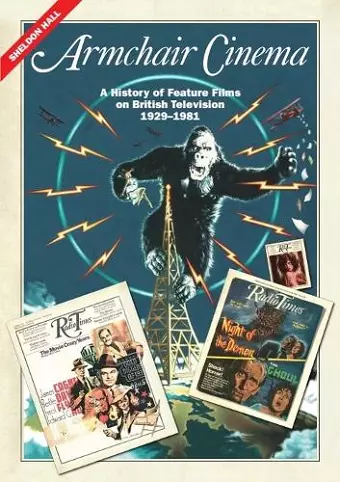Armchair Cinema
A History of Feature Films on British Television, 1929-1981
Format:Paperback
Publisher:Edinburgh University Press
Published:31st Dec '25
Currently unavailable, our supplier has not provided us a restock date

Since broadcast television first emerged as a serious alternative to the cinema, more people have seen films on TV than by any other means. Feature films originally made for the big screen were initially withheld from TV by the film industry in the competition for audiences. Struggles between film and television interests settled into a truce in the mid-1960s, since when thousands of films have been shown on British terrestrial television each year. They assumed particular importance in the 1970s and 1980s, when cinema blockbusters became major TV events and themed seasons gave viewers access to many older movies. This book provides a comprehensive history and analysis of the ways in which cinema films have figured in TV programming in the UK and the role that British television has played in changing the consumption of film entertainment.
Often uneasy bedfellows, cinema and television have nonetheless always been in a relationship. In Armchair Cinema, Sheldon Hall’s meticulous archival research informs an illuminating history of where many films find their biggest audience – at home. This is the untold story of feature films on the small screen in Britain (1929-1981). -- Justin Smith, Professor of Cinema and Television History, De Montfort University
"Sheldon Hall's pioneering Armchair Cinema examines in forensic detail - with a wealth of fascinating archival material - the history of the often stressful relationship between broadcasters and the film industry, and of the changing status of film in television programming, in the process laying the foundations for a fertile new area of media studies. This is an important and absorbing book." -- Sir Christopher Frayling, Emeritus Professor of Cultural History Royal College of Art and Visiting Professor of Arts, University of Lancaster
Hall packs his pages with so many compelling stories. Learn how the Carry On comedies doubled box office after broadcast, how sneaky U.S. distributors passed off Edgar Wallace and Sherlock Holmes flicks as TV shows to get around a limit, and why a UK exec was “utterly revolted” by 1933’s King Kong. King Kong! -- Rob Lott * Flick Attack *
From scheduling to censorship, Hall covers plenty of ground, such as the first movie broadcast on British TV in 1937 – not The Student of Prague (1936), as often claimed, but western The Last of the Clintons (1935) – through to the start of the 1980s. I keenly anticipate the proposed second volume. -- Pamela Hutchinson * Sight & Sound, Editors' Choice: September 2024 *
Rigorously researched and illustrated with schedules and magazine-cover arts, it's a compelling vision of days of TV past. -- Joel Harley * Total Film *
There will be nostalgia here for those who grew up on late-night horror screenings in the 1970s or the black-and-white films that filled many a rainy weekend afternoon. It is an authoritative and impressive piece of research, presented with a dry wit, and comes highly recommended. -- Adrian Smith * Cinema Retro *
Entirely accessible with wry wit and occasional clearly-unresisted puns. (The chapter on editing films for television is called "Abridged Too Far".) If you have any interest in the subject, it's essential reading. -- Gary Couzens * CineOutsider *
Armchair Cinema is full of gems, and demands a sequel covering the glory years of Channel 4 - and the retreat into English-language cinema during the 1990s. -- Henry K. Miller * Sight and Sound, October 2024 *
Armchair Cinema is an expansive, detailed, richly illustrated and annotated (making full use of appended data) exploration of the connection between cinema, film and television, which will be of interest to many media scholars and social historians alike. -- Kevin Geddes * Critical Studies in Television *
Armchair Cinema is an important – indeed, one might say monumental – work of scholarship that will command major intellectual currency in both British film and television studies [...] This book will be of significant interest to armchair cinephiles as well as teachers, researchers and students. A ‘sequel’ taking up the history from the arrival of Channel 4 in 1982 is promised and will be eagerly awaited. -- James Chapman * Journal of British Cinema and Television *
- Winner of Sight & Sound's Editors' Choice: September 2024 2024 (UK)
- Commended for British Association of Film, Television and Screen Studies Awards: Best Monograph Award 2025 (UK)
ISBN: 9781399520140
Dimensions: unknown
Weight: unknown
536 pages